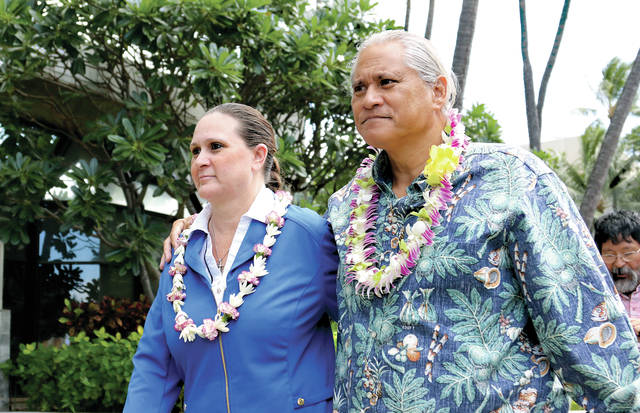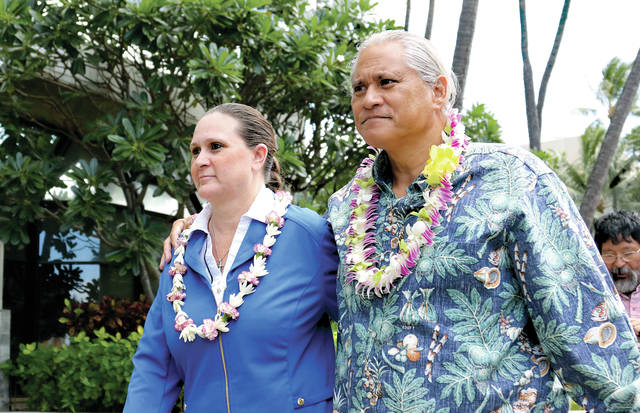HONOLULU — A former Honolulu police chief and his deputy city prosecutor wife must provide financial details showing why they can no longer afford to pay attorneys to defend them in a corruption case. ADVERTISING HONOLULU — A former Honolulu
HONOLULU — A former Honolulu police chief and his deputy city prosecutor wife must provide financial details showing why they can no longer afford to pay attorneys to defend them in a corruption case.
Lawyers for Louis and Katherine Kealoha said in a motion filed late Tuesday that the couple can’t afford to fund a defense and they should receive free, court-appointed counsel.
“Their assets have been effectively frozen by the federal government, and the terms of their bond prohibit them from even applying for a loan,” the motion states.
In court Wednesday, U.S. District Judge J. Michael Seabright asked the couple to fill out a financial affidavit and return to court for a hearing on Thursday.
The Kealohas are accused of framing a relative in an attempt to discredit him in a financial dispute. Katherine Kealoha bilked banks, relatives and two children whose trusts she oversaw to pay for a Maserati, Elton John concert tickets and other personal expenses in the couple’s lavish lifestyle, U.S. prosecutors said.
The Kealohas were arrested last month and released on bond after pleading not guilty. Four current and former officers were also indicted in the case.
Seabright took issue with the comments about the assets, noting that terms of the Kealohas’ bonds prohibit a loan unless approved by court officials. The Kealohas haven’t tried to seek permission to do so, Seabright added.
One of the Kealohas’ attorneys, Kevin Sumida, told Seabright the couple wanted to sell their home in the affluent Honolulu neighborhood of Hawaii Kai to raise money for their defense.
But Seabright noted that even though the house is assessed at more than $1.2 million, there wouldn’t be much left after paying debts on the property, including $400,000 to $500,000 owed to Sumida.
“We need to be honest and have some integrity here,” he told the lawyer.
Louis Kealoha, who agreed to retire amid the federal investigation that led to the indictment, has a “healthy pension,” Seabright said, but “I understand this case is going to be very expensive.”
The motion, which also says the current lawyers want to withdraw from the case, suggested there are no Hawaii lawyers willing or able to represent the Kealohas.
There are less than 40 lawyers on a list for indigent clients in federal court in Hawaii, and some already represent the Kealohas’ co-defendants. Those lawyers agree to accept fees from the government that are less than what they could charge.
The Honolulu Federal Defender’s Office can’t represent the couple because it provided counsel for the man the Kealohas are accused of framing.
In the federal court system, qualifying for a free lawyer is based on “realistic costs” of defending a criminal case, explained Alexander Silvert, a federal defender who represented Katherine Kealoha’s uncle, Gerard Puana.
“Courts are aware of how expensive it is to retain a lawyer,” Silvert said.
Silvert estimates a private attorney would charge $250,000 to $400,000 to defend the Kealoha case.
Puana’s 2014 trial ended in a mistrial and charges that he stole the Kealohas’ home mailbox were dismissed. Silvert then told federal authorities that the couple abused their power to frame Puana.





